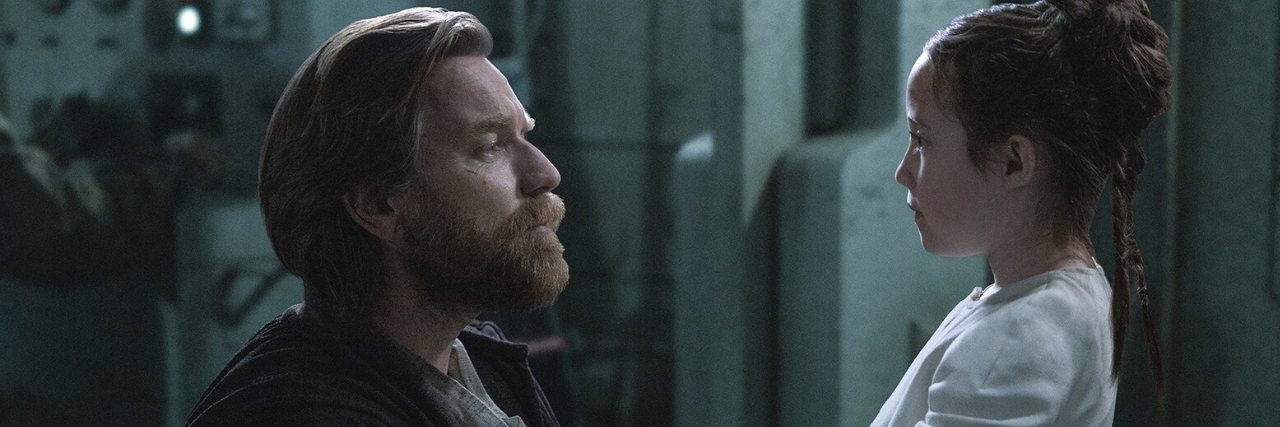How 'Obi-Wan Kenobi' Proves the Power of Connection in Healing Trauma
Editor's Note
There will be spoilers beyond this point. Please proceed with caution (because we don’t want to be the ones who spoil you!)
This whole writing is basically a massive spoiler for all things “Obi-Wan Kenobi” and “Star Wars” in general. Please note that I enjoy explaining such things in a slightly cavalier way, so don’t come at me with pitchforks if I don’t perfectly follow canon. To top it off I’m also going to assume you are familiar with the general “Star Wars” plot.
At the end of “Revenge of the Sith,” Obi-Wan chops Anakin in half and leaves him burning in lava, effectively killing him (or did he?). Not because he wants to, but because he feels he has no other choice. Yes he’s defending himself, but Anakin has become evil personified, awkward.
• What is PTSD?
“You were my brother, Anakin! I loved you,” cries out Obi-Wan breaking the hearts of “Star Wars” fans across the galaxy.
Cue Darth Vader’s mechanical breathing. We didn’t precisely know what happened next… until now.
Disney+ has favored us with a new Obi-Wan series. It takes place about 10 years after the whole lava situation.
We rejoin this former Jedi Master and discover he’s been laying low. He’s also been suppressing his Force abilities, chopping meat for a living, and is ignoring the conflicts around him. Hello, there!
As per usual, there are some fans that aren’t happy. I think I know why, they want to see Obi-Wan, Jedi Master, being a badass. And I get that, at least on the surface, but come on y’all, he hasn’t had it easy.
Am I able to clinically diagnose Obi-Wan? No. Am I going to do it anyways? Yes.
He has post-traumatic stress disorder (PTSD).
We’ve clearly established the traumatic history, so let’s shift to looking at the symptoms. He’s reexperiencing the trauma through nightmares and flashbacks. He’s engaged in avoidance, he is not connecting with others while working a monotonous job. We can see hyperarousal in his extra security measures and disturbed sleep. And last but not least, there have certainly been negative changes in thinking and mood, which is especially noticeable when we see him refusing to help a fellow Jedi who has been discovered by the Inquisitors.
Understanding that Obi-Wan likely has PTSD is helpful because it portrays what I believe is an important lesson. I have some theories to share, and I promise it all links up. It’s my opinion that when it comes to trauma, a part of what causes so much pain is that it disconnects us from ourselves and others. We don’t see the humans in the world as safe, and we lose our ability to trust. Trauma is so powerful that it can cause us to dissociate, the ultimate form of detachment. Therefore, if my theory is correct, connection has the ability to be healing.
It’s also my theory the story of Star Wars is fundamentally about connections or lack thereof, and how these impact the life of the characters. There is always a Master leading a Padawan (on a good or bad path), the rebels persist because they love their friends, Darth Vader himself is pushed along due to the hate and anger he feels over his mother’s death. Arguably every character has elements of their relationships driving their story.
And as I promised, this does all come together, so let’s return to our Obi-Wan.
As the series progresses, he begins to change, he collects up new friends and allies. He chooses to trust, he allows himself to care, and in the end, he seems to forgive himself for his past failings. Fret not fans, he’s a Master once again, and he is not alone.
The series has many powerful scenes, and there is one final moment that especially sticks out in my mind. Obi-Wan comforts Reva, a former antagonist, and as he does so, he declares that by choosing mercy, she has become free. There’s a pause, and then he proclaims “we both have.” There it is again, connection. Immediately after this, we see a contrasting conversation. The Emperor asks Darth if his feelings for Obi-Wan are causing him to fail. Darth states Obi-Wan means nothing to him, disconnect. And if you know the story, we know Darth continues on a dark path.
So to circle back to our hero, at the end of six episodes, is his PTSD gone? I’d guess, probably not, but I would suggest he’s doing much better.
I think this story arch is a beacon of hope. Particularly for those of us who, like myself, have also experienced trauma and resultant mental illnesses. We are shown in this series that even a superhero can be harmed in the face of horrible events, we aren’t weak — we are human. We are also shown the path forward. It’s a path that is not always easy, but that leads us back to ourselves by not walking alone. There is hope, even if just like Obi-Wan, it takes us a while to see it.
If you enjoyed this article, please take a moment to check out some of my other articles here on The Mighty. If you’d like to follow along with my journey, you can find me on Instagram as @mentalhealthyxe.If you also enjoy Star Wars you may also like to read my other writings about it, located here and here.
Lead image via Obi-Wan Kenobi’s Facebook Page

